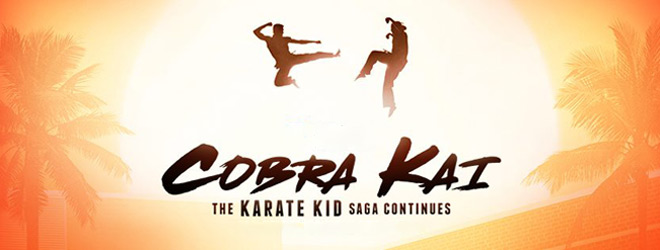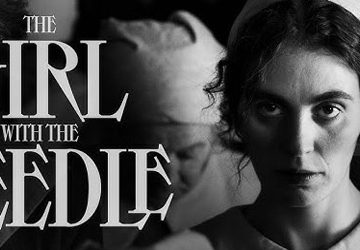Back in 1984, life was much different growing up as a teeanger than in 2018, or was it? Truth of the matter is, while what is socially acceptable and as technologies advance, there always was, and always will be, someone out their bullying another person. Unfortunately part of nature, the significant difference between 30 something years ago and today, is back then, the reaction to bullying was vastly different. Now, we are taught to squash bullying at the source – tell an authority, etc. A good start, and sometimes the best thing to do, too often it does not always resolve the matter. By nature, self-image is based on own our ability to defend ourselves from attackers, not cower in the face of adversity.

All this in mind, chances are, back in the day, many kids who had a bully problem would enroll in karate lessons at a local dojo. Exemplifying this struggle we all face, the 1984 film The Karate Kid made every kid feel like a winner, no matter what their shortcomings may be. Perhaps, just perhaps, the message of the film is something we could use today? No, that is antiquated aggression that has no place in a progressive social climate, or is it? Here to silence naysayers, the saga of The Karate Kid makes a deserved return into popular culture with the brand new series Cobra Kai.
A concept that has been brewing for some time, production began in the summer of 2017, and on May 2, 2018 the 10-episode inaugural season of Cobra Kai became available for consumption on YouTube Red. Some may wonder, how in the world do they connect the story that began 34 years ago when a slight of frame kid from New Jersey, Daniel LaRusso, faced a major bullying problem when relocating to California with his mom. Primarily pushed around at the hands of a seemingly typical bully named Johnny Lawrence, they are grown men now, so how in the world would the past affect them?

All valid questions, series creators Jon Hurwitz, Hayden Schlossberg, and Josh Heald pulled out all the stops to make the story of Cobra Kai as strong and believable as possible. For starts, they retained original film stars Ralph Macchio (The Outsiders 1983, My Cousin Vinny 1992) and William Zabka (Just One of the Guys 1985, Back to School 1986) to portray their grown-up selves, Daniel LaRusso and Johnny Lawrence.
Additionally, they enlisted a talented cast including Courtney Henggeler (The Big Bang Theory series, Mom series) as Daniel’s wife Amanda, Xolo Maridueña (Parenthood series, Twin Peaks series) as Miguel Diaz, a new kid in town with age old problems, Tanner Buchanan (Grey’s Anatomy series, Designated Survivor series) as Robby Keene, Johnny’s neglected, estranged teenage son, and Mary Mouser (Son of the Mask 2005, NCIS series) as Samantha, Daniel’s strong-willed teenage daughter. All portraying their roles excellently, standout supporting characters include Aisha Robinson (Nichole Brown in her debut) and Eli aka Hawk (Jacob Bertrand: This Means War 2012, Ready Player One 2018), two bullied teeangers who turn to karate to boost their self confidence.
Coming together, each character has its own dynamic, but best of all, not everything is black and white – possibly the strongest message of the new series. What does this mean? Well, an aspect many have forgot in today’s hyper-sensitive, overactive social climate, Cobra Kai drives home the idea that there is almost always a grey area and two sides to every story. Back in the original blockbuster hit film The Karate Kid, we only saw the bully side of Johnny Lawrence, thus making him the outright villain. In Cobra Kai, we get a glimpse into the world of an adult Johnny Lawrence, one that is severely fractured. Wait, the kid who seemingly had it all in high school – money, girlfriends, and looks – lost it all because of one karate tournament loss? Well… there is much more to Johnny than meets the eye.
On the other spectrum of adult life, Daniel LaRusso has gone on to become a highly successful auto dealer. He has it all – self-confidence, a beautiful family, and a beautiful home. Then, out of nowhere, Johnny Lawrence re-enters his life, and Daniel seemingly loses all self-control, focusing on the past. Unwilling to accept that Johnny perhaps has changed, or that there is another side to the story of his former nemesis, Daniel starts to act selfishly, childishly, and in many ways turns into the antagonist he fought to defeat. Fascinating, how the tables have turned.

Now facing off again as adults, not physically, but messing with one another’s assertion as men, Daniel and Johnny learn not much has truly changed between them. Flipping the script, in Cobra Kai, more often than not, you will find yourself cheering for Johnny, while shaking your head in disapproval of Daniel’s actions. Which raises the question, has Daniel gone bad, or merely lost his focus in life? Has success gone to his head? Perhaps, but no one is completely ever a lost cause, especially when they had an amazing mentor like Mr. Miyagi (Pat Morita: Karate Kids series, Happy Days series). It is up to Daniel to reflect on the lessons Mr. Miyagi taught him in his young years – to recenter and see matters clearly.
While the Johnny and Daniel stories are compelling within themselves, the new proteges, Robby Keene and Miguel Diaz, are stellar entries into The Karate Kid saga. Two likeable, relatable characters, it is a classic case of some behaviors are taught. Johnny, looking for direction in life, takes on Miguel as his student, looking to teach him self-defense, confidence, and to strike first. Meanwhile, Daniel, looking to find balance in his own life, takes on Robby as his student, seeing something positive in the misguided teenager, yet having no knowledge he is Johnny’s son. In the end, history repeats itself and two students face off at Under-18 All-Valley Karate Tournament. Who will win? Who will lose? Will victory be as sweet as expected?
There is a whole lot to digest in the 10-episode season of Cobra Kai, and honestly, it is so easy to binge watch in one night, because it really plays out like a full-length feature. Each episode offers a new piece to the puzzle, and none of it is boring. Well-paced, the creative team do a magical job of marrying the original film into the new plot-line without it feeling dated or lame. In fact, this is a new story that universal fans of The Karate Kid and the new millenium can dig into and equally find satisfying.

Overall, Cobra Kai is perhaps one of the best feature films translated into a television series in some time. The style is modern, yet classic. The message is vivid, yet broad and open to interpretation. The bottomline – it re-energizes the confidence in all of us that we do not need to lay down and accept defeat. Then again, it also teaches us there is a balance to it all, showing that aggression is not always the answer, and most certainly we should always have mercy on one another. Wow, all that heavy context that originated from a 1984 film? The answer is a resonating yes!
Now, with season 1 of Cobra Kai out and picking up more viewership daily, season 2 is in production, so prepare for more in 2019. Until then, CrypticRock urge you to check out Cobra Kai, and that is why it gets 5 out of 5 stars.






No comment